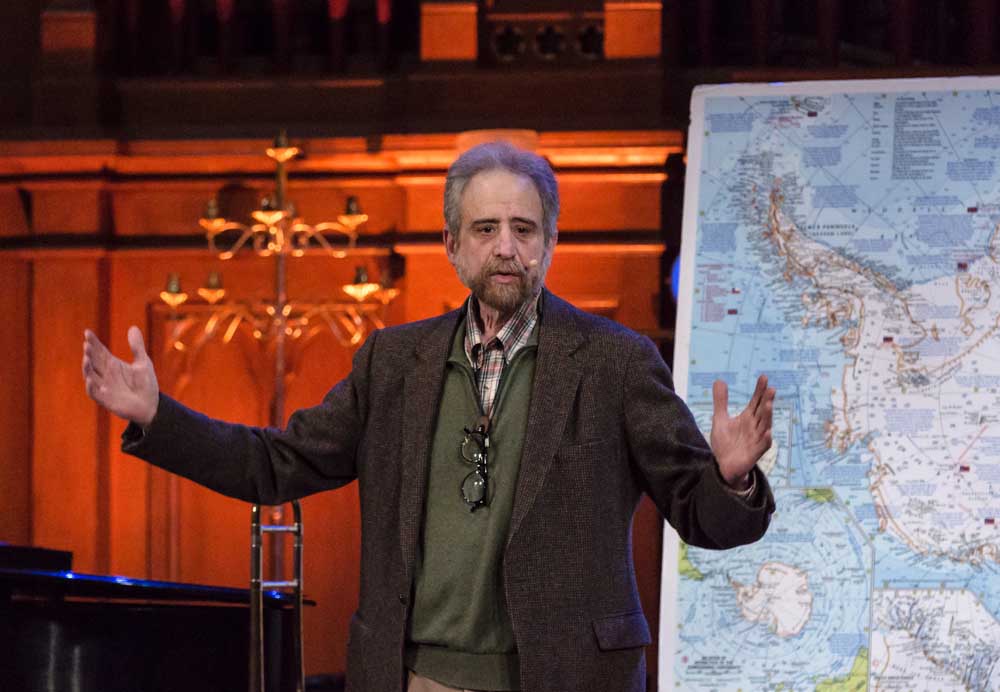Q&A with storyteller Lawrence Howard
Published 12:00 am Thursday, April 12, 2018

- Submitted photo
Who: As has turned into a spring tradition, speaker and storyteller Lawrence Howard returns to Central Oregon this weekend to perform the latest in his Armchair Adventure storytelling series, “Polar Opposites: Amundsen, Scott, and The Race For The Pole.” Howard, co-founder of the nonprofit Portland Story Theater, which preserves and advances the art of storytelling, has previously told the stories of The Essex disaster (2015), Ernest Shackleton (2016) and Fridtjof Nansen (2017). He’ll present “Polar Opposites” first Friday in Crooked River Ranch (sold out), and again at 7 p.m. Saturday at Cascades Theatre, 148 NW Greenwood Ave., Bend. Tickets are $18 at the door, $15 in advance at pdxstorytheater.org/tickets.
Q: So you have a new Armchair Adventure story for us?
A: Yes, “Polar Opposites.” It’s the story of Roald Amundsen and Robert Falcon Scott, and the race to the South Pole in 1911 and 1912. … They were both trying to reach the South Pole at the same time, and it became a race. It became a competition. The fact that Amundsen beat Scott had huge, long-ranging repercussions.
Q: What were some of the repercussions?
A: In my mind, the fact that Scott and his companions all froze and starved to death on the return journey, was really the direct result of having been beaten. They were undernourished, exhausted and suffering from scurvy, etc., but I think the crushing disappointment of having been beaten to the pole was the final factor that sealed their fate. I think they might have survived had they not been beaten.
Q: How did you create the Armchair Adventure series?
A: The Armchair Adventure series started with my love of the Shackleton story. My dad was a huge fan of the Ernest Shackleton story. I just sort of grew up with that. The book “Endurance,” by Alfred Lansing, was on my dad’s bookshelf and I read it as a teenager. It just became a lifelong interest that my dad and I shared together. And the fact is that the four or five major expeditions of what they call the Heroic Era of Antarctic Exploration are all intertwined because many of the same explorers were on multiple expeditions. You can’t really read about Shackleton without also learning about Scott, and you can’t learn about Scott without learning about Amundsen. They’re all sort of linked together.
Q: How were they received in their time? Were they hailed as heroes?
A: Very much so. Scott became a great hero. In death, he sort of became a martyr in the cause of the British Empire. And that’s sort of an important piece of this. It’s the very beginning of the 1900s and the British Empire is just starting to crumble around the edges. This expedition to try and claim the South Pole and add Antarctica to the British Empire was a huge event nationally and internationally. All eyes were focused on this.
Q: What’s the ongoing appeal of their stories more than a century later?
A: To me the appeal of their stories is the courage and endurance and really, I think it’s the audacity of the human spirit. It’s the enormity of what they were trying to accomplish. The extreme unlikelihood that they would succeed and yet the determination that drove them forward.
— David Jasper, The Bulletin








